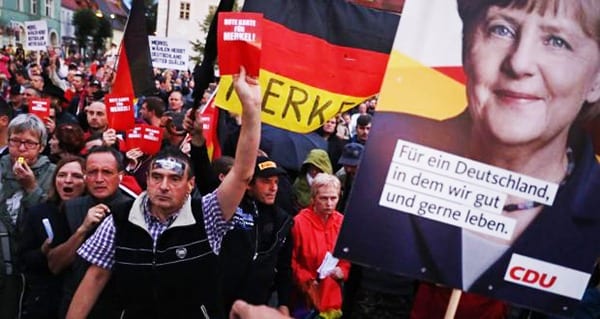Editor: Philip Ragner | Tactical Investor
Yes. Leading AfD figures made extremist statements before and during the 2017 election campaign.
Since the vote, Alexander Gauland has talked of fighting an “invasion of foreigners” and their campaign openly focused on Islam and migration. AfD sees Islam as alien to German society. Some of their rhetoric has been tinged with Nazi overtones.
They sit in the same political family as France’s far-right National Front and Austria’s far-right Freedom Party – as well as the populist, anti-Islam Dutch Freedom Party (PVV) of Geert Wilders. Nigel Farage, former leader of the UK’s anti-EU party UKIP, took part in their election campaign.
AfD started out as an anti-euro party and still has a relatively moderate wing, so almost a million of its new voters have come from the centre-right CDU, and half a million from the centre-left SPD.
Their anti-immigrant rhetoric now puts them in the far-right camp. But their brand of nationalism is less extreme than that of Germany’s NPD, seen by many as a neo-Nazi group.
Alexander Gauland, a 76-year old lawyer, has made a number of remarks condemned as racist, including one on footballer Jérôme Boateng, who was born in Berlin to a Ghanaian father: “They like him as a football player. But they don’t want to have a Boateng as their neighbour

AfD’s big success has been in challenging Angela Merkel’s
Decision to let in around 1.3 million undocumented migrants and refugees, mainly from the Middle East, since 2015.
They have tapped into anxieties over the influence of Islam. The party wants a commission set up to investigate the chancellor’s “breaches of the law” in allowing them in.
When the numbers of migrants arriving in Germany surged in 2014-2015, AfD made that the focus of its party platform. There were contacts with the anti-immigration Pegida movement, which staged weekly marches against what it called “the Islamisation of the West”. Full Story
In 1991 Belgium had its (first) black Sunday when the populist radical right Flemish Block gained 6.8% of the national vote. Since then many other western European countries have gone through a similar experience, from Denmark to Switzerland. And now, even the ever stable Germany has its own schwarzer Sonntag, and it’s blacker than most people had expected.
The populist radical-right Alternative for Germany (AfD) party
Enters the Bundestag, the German parliament but does so almost certainly as the third biggest party, with a stunning 13.3%, an increase of 8.8 percentage points according to the exit poll. Moreover, both the centre-right CDU/CSU and the centre-left SPD scored their worst electoral results in the postwar era, with 32.5% and 20% respectively. This means that AfD got two-thirds of the SPD vote, and 40% of the CDU/CSU vote.
Polls from German state TV showed that AfD has its Hochburgen(strongholds) in the former communist east of the country. While it scored on average 11% in West Germany, it got 21.5% in East Germany, almost twice as much. This is in line with its results in the regional state elections, in which AfD also gained its largest support in the east.
AfD got more votes from past non-voters (1.2 million) than from the CDU/CSU (1 million) or SPD (500,000). In many ways this is an anti-Merkel vote, reflecting opposition to her controversial Willkommenspolitik towards refugees, which not only pushed some voters of mainstream parties to switch but also mobilised previous non-voters.
The same poll also shows, for example, that 89% of AfD voters thought that Merkel’s immigration policies ignored the “concerns of the people” (ie German citizens); 85% want stronger national borders; and 82% think that 12 years of Merkel is enough. In other words, AfD has clearly profited from the fact that immigration was the number one issue in these elections. Full Story
This is a very important moment in German history… They are trying to exploit people’s fears and make them bigger.
The party, in response to the European debt crisis that marked the years preceding its launch, challenged German-backed bailouts of Europe’s struggling southern economies such as Greece.
Their manifesto, endorsed by a number of Eurosceptic academics, called for the dissolution of the euro currency and less centralisation of power in Brussels.
Despite failing to win the required five percent of votes needed to gain representation in the German parliament, the party made a mark in the election, winning 4.7 percent of votes.
The AfD had proved effective in occupying the space left behind by Chancellor Angela Merkel‘s gradual shifting of her conservative CDU party closer to the political centre ground.
“Merkel has been changing the CDU since 2005, moving it more to the centre. In the years 2005-12, you had people inside the party that were dissatisfied with where she was leading it,” Julian Gopffarth, a researcher at the London School of Economics’ European Institute, tells Al Jazeera. Full Story
Other Stories of Interest
Experts Making Stock Market Crash Forecasts usually know nothing
Anxiety and Greed Index Don’t Support Stock Market Crash











